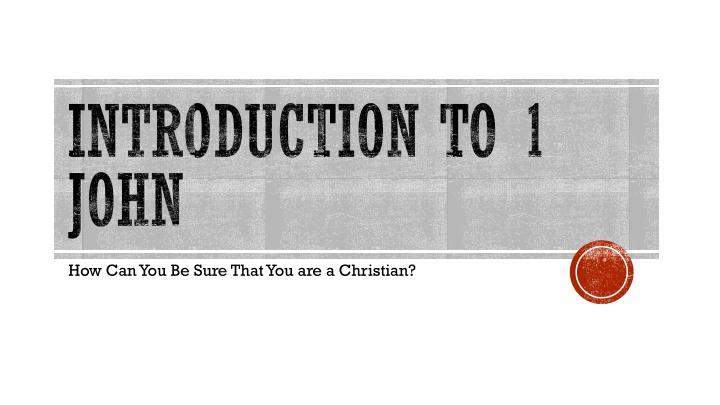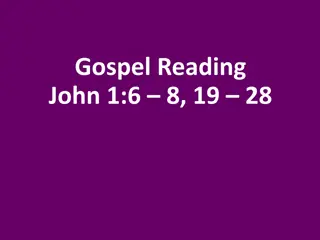
Assurance of Salvation and Christian Identity in 1 John
Explore the key themes and purpose of 1 John, delving into how believers can have certainty of their salvation. The book provides objective criteria to determine one's Christian identity, emphasizing love, obedience, and faith. Discover a step-by-step method to understand the book with practical application questions for self-examination.
Download Presentation

Please find below an Image/Link to download the presentation.
The content on the website is provided AS IS for your information and personal use only. It may not be sold, licensed, or shared on other websites without obtaining consent from the author. If you encounter any issues during the download, it is possible that the publisher has removed the file from their server.
You are allowed to download the files provided on this website for personal or commercial use, subject to the condition that they are used lawfully. All files are the property of their respective owners.
The content on the website is provided AS IS for your information and personal use only. It may not be sold, licensed, or shared on other websites without obtaining consent from the author.
E N D
Presentation Transcript
INTRODUCTION TO 1 JOHN How Can You Be Sure That You are a Christian?
I. METHOD OF OVERVIEW (4 STEPS) (1) Find Repeated Words (2) Identify repeated and crucial phrases (3) Establish a general outline (4) Identify key themes and the purpose of the book
II. KEY THEMES Love God s love for us; our love for God; and our love for one another Truth -- Faith and belief in true doctrine Practice of Righteousness and obedience to God s commandments The predominant theme of these letters is Christian certainty the certainty of Christian people is twofold objective (that the Christian religion is true) and subjective (that they themselves have been born of God and possess eternal life). Both are expounded by John, who takes it for granted that this double assurance is right and healthy (Stott, p. 56). John s ultimate aim in his first Epistle is to give his readers solid grounds for assurance that they have eternal life through belief in Jesus Christ (Marshall, p. 55).
III. PURPOSE Objective grounds for the believer s assurance of salvation. How you can be sure that you are a Christian and possess eternal life. 1 John provides a number of criteria or objective tests by which we can examine ourselves and gain confidence that we truly are born again! 5:13 is the main purpose statement of the book: These things I have written to you who believe in the name of the Son of God, so that you may know that you have eternal life.
IV. ESTABLISH A GENERAL OUTLINE Prologue the Word of Life. 1:1-4 Walking in the Light. 1:5-2:2 Keeping God s commands. 2:3-11. The new status of believers and their relation to the world. 2:12-17 A warning against antichrists. 2:18-27 God s children have hope and pursue purity. 2:28-3:3. God s children will not practice sin. 3:4-10. Christians are marked by brotherly love. 3:11-18 Assurance and obedience. 3:19-24. True teaching versus false teaching. 4:1-6 God s love and our love. 4:7-12. Assurance and Christian love. 4:13-5:4 The true faith confirmed. 5:5-12 Christian certainties. 5:13-21
IV. PRACTICAL APPLICATION QUESTIONS If a person wonders whether he is really saved, he should carefully read this book and ask himself these questions: Have I experienced spiritual fellowship with God and with other Christians? (1:3-4) Am I sensitive to sin? (1:5-8) Have I experienced forgiveness, cleansing, and restoration after confession? (1:9) Am I keeping His commandments? (2:3, 5) Am I obeying God s will? (2:17) Am I practicing righteousness? (2:29) Am I looking forward to the Second Coming of Christ? (3:1-3) Am I no longer characterized by habitual sin? (3:9) Do I genuinely love other Christians? (3:14)
PRACTICAL QUESTIONS Am I free from moral guilt? (3:21) Have I experienced answered prayer? (3:22) Do I have the inner witness of the Holy Spirit? (3:24) Have I heard the Word of God through His official representatives? (4:5-6) Do I genuinely love God? (4:19) Do I believe that Jesus is the Christ? (5:1) Do I believe God s testimony concerning Christ? (5:10-11) Affirmative answers to these questions should bring inward assurance that one truly is a regenerate child of God.







